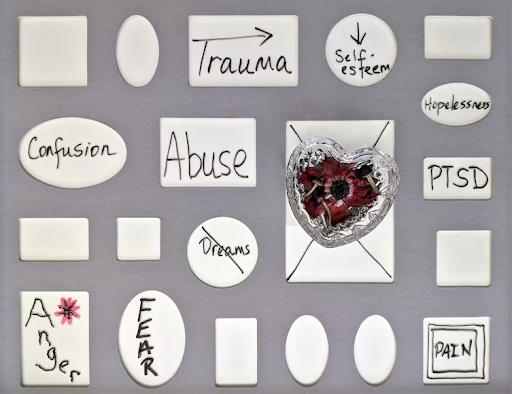Have you felt like you are not feeling like yourself lately, but you don’t know what’s wrong? You find yourself feeling anxious, irritable, or on high alert most of the time. Or you may have found yourself getting triggered by things without any specific reason.
There is a great possibility that you are struggling with unresolved trauma.
No matter what has caused the trauma, it could lead to a myriad of negative feelings and emotions. Trauma can make you feel hunted, leading to a change in your perspective and making you fear certain things, situations, etc. To live a normal happy life, you must heal your unresolved trauma.
Here are seven tips to help you deal with your unresolved trauma.
1. Acknowledge Your Feeling
When you experience trauma, you might go through adverse feelings such as rage, fear, frustration, or sadness. These unresolved feelings may make you feel detached or ignore intense situations and feelings.
As a result, your relationships begin to suffer. You may try avoiding close relationships because you fear getting hurt or rejected.
On the other hand, if you have even been in a relationship with abusive people, it may make you feel like you are not worthy of love. So, you may try to avoid close connections and stop letting people in.
An important way to deal with these traumas is to learn how to accept feelings and emotions. If you try to avoid these feelings, it may leave you feeling more depressed in the long run.
That’s why whether you are feeling sad, guilty, angry, or shocked, allow yourself to feel these emotions without any judgment. When you let yourself feel the difficult emotions you are feeling, these emotions don’t stay pent up, and you learn to cope with them, leading to them getting resolved slowly.
2. Being Compassionate to Yourself
A strong self-compassion helps you form better health, well-being, and healthy relationships. Try giving yourself positive encouragement when facing stressful or difficult situations.
You need to become your own cheerleader and number-one supporter. Hold a non-judgemental attitude toward yourself, and try to accept yourself even when you are in pain.
To boost your self-compassionate skills, you can eat healthily, massage your body, lie down or rest when you need, and take a walk to comfort your body.
3. Opt for Tantric Healing
While it may sound anecdotal, did you know that you can use tantric healing to heal sexual trauma? If your trauma is related to romantic relationships or intimacy, you might have issues physically and emotionally opening up and connecting to people.
In such cases, you need to consider opting for tantric healing. Some health experts believe that trauma can stay in our body almost like muscle memory, and physical therapies like tantric massage can heal emotional damage by releasing that stored trauma.
According to Tantra, the advantage of tantric massage is that it can help remove our trauma-related “energy blockages.”
Even if you don’t believe in energies or tantra, you can still opt for tantric massage, as that will allow you and your partner to become intimate in a slower-paced manner, which might help the traumatized person to heal slowly.
4. Reconnect with Family and Friends
Your relationships with your loved ones can be a great source of strength after experiencing any traumatic situation.
Some studies prove that when you feel overwhelmed or anxious, any kind of social interaction and support can decrease the cortisol your body produces.
So, never hesitate to open up to those you care about. You can share and talk about any traumatic situation with them that is bothering you.
Social interaction and sharing can be useful to make you feel comfortable regarding your traumatic experience. Spending quality time with your near and dear ones makes you feel more like yourself and helps you forget stress.
5. Self-Care
Another important way to cope with trauma is to ensure that you never overlook your health and well-being.
Trauma might make you feel like you are not worthy of being taken care of. That’s why it becomes easy for you to neglect all your basic needs when struggling with trauma.
But, it’s important to prioritize self-care and follow a strict self-care routine, making a promise to yourself that you will make yourself happy.
If you ensure proper efforts to take great care of yourself, you will eventually get the strength to recover. Otherwise, a lack of self-care, like not sleeping properly or a poor diet, can worsen your traumatic situation.
Deep breathing, visualizing things that make you happy, recalling good moments, spending time in sunlight and nature, and always entertaining positive thoughts are all important for your body to feel good.
6. Reduce Stress
There is stress in everyone’s life. The effects of stress become more severe, especially after experiencing any traumatic situation. The following tips may help you release stress.
- Physical workouts, including walking, biking, jogging, swimming, gardening, housecleaning, weightlifting, and other types of exercises, can improve your mood and fade away your irritations.
- Eating a healthy diet, including foods that boost your mood and overall mental health.
- Avoid unhealthy habits such as drinking too much alcohol or caffeine, smoking, using illegal substances, etc.
- Meditation can benefit your health and emotional well-being.
- Give laughter a try; it lightens your mental load and brings positive physical changes.
- Controlled breathing exercises are also a popular stress reliever.
- Getting quality sleep as it affects your energy level, mood, concentration, and overall body functionality.
- Write down your feelings and thoughts in a journal to pent-up emotions.
7. Professional Treatment Options
If the stress-relieving techniques don’t improve your condition over time, you need to seek professional reinforcement through counseling or therapy.
Evidence-based treatments like cognitive behavioral therapy (CBT), trauma therapy, and stress inoculation training (SIT) can be beneficial.
Final Words
Now that you know how to deal with your unresolved trauma, we hope you make time to try these options once you find the trauma symptoms in yourself. These will heal your trauma healthily, helping you move on with your life.








Leave a Reply
You must be logged in to post a comment.